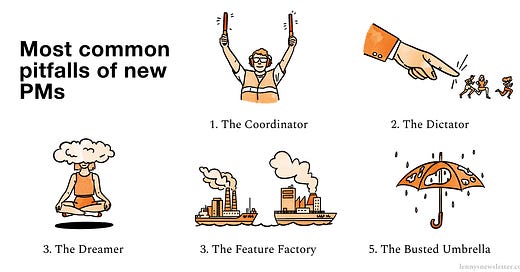The most common pitfalls of new product managers
The Coordinator, The Dictator, The Dreamer, The Feature Factory, and The Busted Umbrella
👋 Hey, Lenny here! Welcome to a 🔒 subscriber-only edition 🔒 of my weekly newsletter. Each week I tackle reader questions about product, growth, working with humans, and anything else that’s stressing you out about work. Send me your questions and in return I’ll humbly offer actionable real-talk advice.
Q: I just became a product manager. What would you say are the most common pitfalls of new PMs?
Being a new product manager is a lot like being a new President. You’re thrust into power, entrusted to lead people (many of whom you’ve barely met) to achieve ambitious goals, with limited authority, all the while learning how to do this job, on the job. Also, you’re immediately jumping from crisis to crisis, with little appreciation, and half the people have no reason to trust you. It’s a surprise anyone ever wants this gig 🥴
The good news is that, unlike the presidency, there are only a handful of pitfalls that trip new PMs up. Also no big red button. Avoid these pitfalls and you’ll have a great shot at re-election keeping your job:
Pitfall #1: The Coordinator
You are a product manager. Not a project manager. You weren’t hired to just coordinate other people’s work. You were hired to bring your own point of view. To help shape the product. To deliver optimal business impact. You do all this not by simply executing other people’s ideas but by actively pushing your team in the right direction and making sure the right product decisions are made.
Signs you are pitfalling:
You rarely have strong opinions about product decisions
You worry about expressing your point of view
You often optimize for team happiness over impact
You don’t maintain a high bar for the work your team takes on
How to avoid this pitfall: Strive to always have a point of view. You don’t need to always share it with others or get your way, but by forcing yourself to always come with a perspective, you’ll start to develop a POV and the confidence to share it. Where do you think this button should go? What feature do you think should be prioritized next? What’s your proposal for next quarter’s strategy? Don’t just coordinate—lead.
Pitfall #2: The Dictator
At the other end of the spectrum is a PM who fully embraces the supposed “mini-CEO” role. This person may have recently transitioned from an engineering or ops role, or is fresh out of an MBA program, and has been waiting for their chance to finally run the show. They think they need to have all of the ideas, micro-manage every decision, and that their teammates are there to execute their plans. Unless you work at Zynga, this won’t work out for you. Your teammates didn’t sign up to report to you. They are your peers, and they expect for their ideas to be heard and their input to be taken into account. The good news is that this will actually lead to better outcomes (and better teammates). The bad news is that you need to learn to lead through influence.
Signs you are pitfalling:
Your specs are incredibly detailed—there’s no room for discussion
You present fully baked roadmaps, strategies, and visions, without genuine interest in feedback
You get frustrated when anyone disagrees with your conclusions
You rarely let someone get their way if they disagree with you
How to avoid this pitfall: Let go. Leave more space for feedback, input, and discussion. Think of yourself more as a team captain than as the CEO. Lead not through force but through trust, collaboration, and influence. Absolutely push the team in the direction you believe they should go, and optimize for impact and good decisions, but see what happens when you give your teammates a little more space to contribute.
Pitfall #3: The Dreamer
Your first responsibility as a PM (especially as a new PM) is to help your team execute, today. To ship, to hit dates, to make sure everyone knows what they should be working on. But many PMs come into the role expecting to spend most of their time developing strategy, visioning, and thinking big. That’s fun, but that’s not the role you signed up for. You need to earn this right. Yes, strategy and vision are essential, but not at the expense of the immediate needs of your team.
Signs you are pitfalling:
There’s frequent misalignment within your team, and among stakeholders
Team members often don’t know what they should work on next





